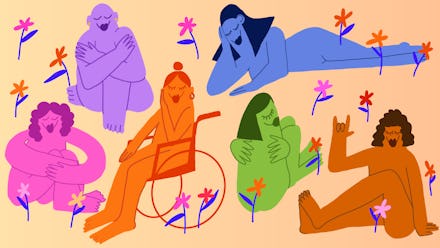How to embrace body acceptance without being ableist

The pandemic — and lockdown-induced lethargy many have experienced for months — did a number on our bodies. Maybe the number on the scale has shifted a little to the right, or our clothes no longer fit. And as gyms open back up, there's a lot of talk, especially on social media, about getting our bods Hot Vax Summer-ready. In the midst of all this noise, a common piece of advice has been to focus less on what our bodies look like and more on what they can do. But while these calls for body acceptance rightly push back against fatphobia, they end up excluding disabled people.
Tinu Abayomi-Paul, a disability rights advocate, writer, and founder of Everywhere Accessible, an organization that crowdsources solutions to accessibility for marginalized people, says that she often feels left out of the body acceptance conversation. "There’s a lot of things that my body can’t do. I wake up some days, and my legs don’t want to work correctly," she says. Abayomi-Paul — who has fibromyalgia, chronic lymphocytic leukemia, audio processing disorder, PTSD, and other mental and physical disabilities — tells Mic that she can walk up and down her stairs twice a day at most, and remains mostly homebound.
When she and other members of the disability community explain how suggestions to focus on bodily ability exclude them, the response usually falls along the lines of, “Well, we weren’t talking about you.” In other words, “we’re not included in the idea of ‘everybody,’” Abayomi-Paul says — even if 1 in 4 adults in the U.S. has a disability, according to the CDC.
If you're abled and feeling down about how you look right now, there are ways to talk about the changes to your body and navigate the emotions they surface that include and value disabled people. Abayomi-Paul shares her insights on how to accept your post-quarantine body without being ableist.
Reframe your idea of body acceptance altogether
Abayomi-Paul suggests a shift from appreciating that you have a body that is X or does Y to appreciating that you have a body at all. “Make it more tied to happiness to be, and not the happiness to be something,” she says.
Even reassurances that "at least you're healthy" can edge problematic territory. Popular understandings of health are wrapped up in the fatphobic belief that if you’re above a certain size, you can’t also be healthy, Abayomi-Paul says. And while she doesn’t believe that feeling grateful for your health is ableist — since not all disabled people are unhealthy — thinking that it makes you superior or that it’s the only thing that gives you worth can devalue people who don’t have healthy bodies. “The language can be changed a little bit to say ‘I’m grateful for my health, but I’m more grateful to just be alive,’” Abayomi-Paul says.
She recommends trying to love and accept your body as it is, right now. “The now is the most important thing — not to focus so much on ‘Oh, this flaw exists’ or ‘This flaw doesn’t exist. It just is. That means I’m here and alive, and that should be enough. Everything else is gravy.”
Remember that your body does not define you
“If we think of our bodies as containing us instead of being us, it’s easier to accept how the physical impacts everything,” Abayomi-Paul says. She suggests viewing your body as a vessel for your mind, consciousness, soul, or whatever essential selfhood you believe it holds. Even if that vessel might look different now than it did before the pandemic, it still carries what makes you, you. That's something worth celebrating.
View your body as a vessel for your mind, consciousness, soul, or whatever essential selfhood you believe it holds.
As Abayomi-Paul tells members of the disability community, “it’s okay to be angry at your body.” But accepting that your body is only one part of you might help make your anger more manageable. She tells Mic about the time she found herself no longer able to get up early like she used to. Whenever she woke up, she’d berate herself. “And then one day, I just realized that nothing about that negative self-talk was helping me get up early,” she says. “There’s no amount of angry I can get to fix my body.” That anger could stress you out even more — which is probably the last thing you need, especially now.
Remember that pre-pandemic “normal” looked different for everyone
When talking about your body as we return to some semblance of normal, remember that not everyone could inhabit the world as freely as you did before COVID-19. You might rejoice that you can get swole again now that your gym’s reopened, or swear to get your office bod back. Such comments can exclude disabled people, though, Abayomi-Paul says. “Some of us have never been able to use the gym,” she points out, or work in an office.
Keep in mind that the “normal” you yearn for might’ve looked very different for disabled people, who had to constantly navigate a world that literally wasn't built for them. “Normal sucked for us,” Abayomi-Paul says. And even as the country reopens, she adds, “a lot of us are immunocompromised and can’t get back to ‘normal.’”
Get plugged into the disability community
Follow disabled people with a diversity of racial, gender, and other identities on social media — “not just disabled people who look like you,” Abayomi-Paul says.
On Twitter, she suggests following Tee Franklin, a comic writer who breaks down what ableism is, and Talila A. Lewis, an abolitionist organizer-attorney who looks at the connection between ableism and white supremacy. Abayomi-Paul’s own Twitter account contains a wealth of knowledge. She also recommends disability advocate Imani Barbarin's TikTok account, where she talks a lot about ableism. Educating yourself on disability justice in this way can help you center your body acceptance in it.